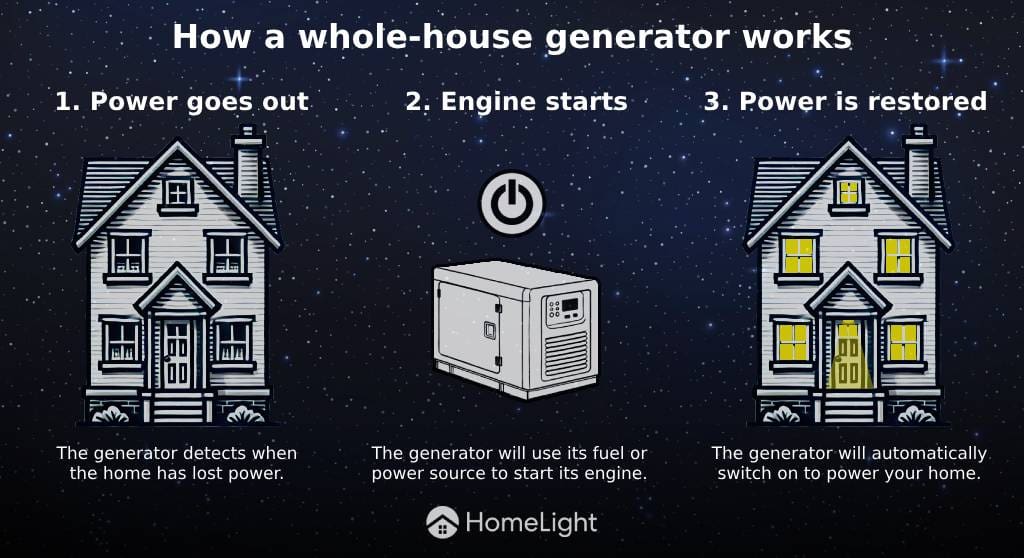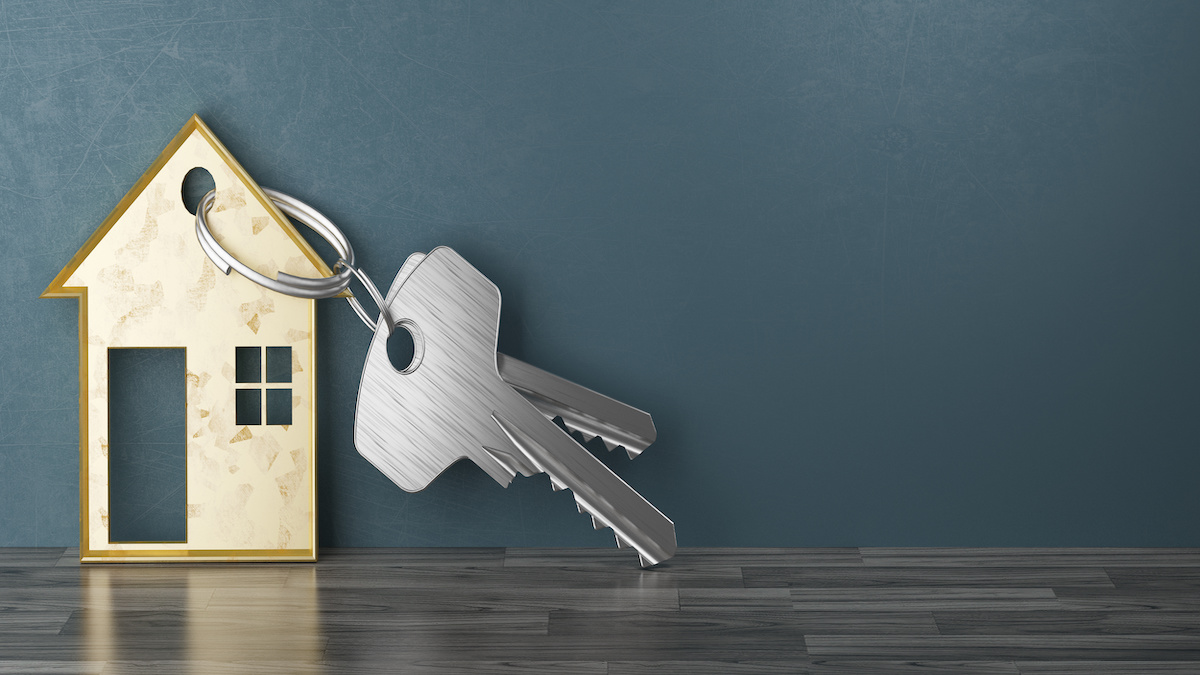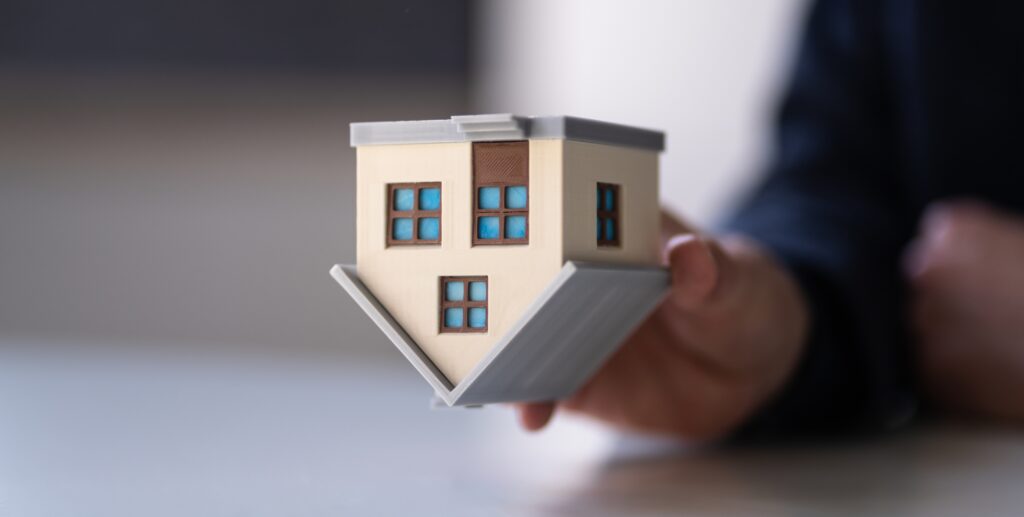Climate change is increasing the frequency and intensity of extreme weather events like hurricanes, wildfires, heat waves, and floods. These events can damage power lines, transformers, and substations, leaving entire areas without power. As homeowners face a growing number of these events, many are asking, Does a generator increase home value?
Installing a generator can provide you with peace of mind now and be a valuable selling point in the future. In this post, we’ll explore the value, costs, benefits, and practical considerations of adding a generator to your property.
How Much Is Your Home Worth Now?
Home values have rapidly increased in recent years. How much is your current home worth now? Get a ballpark estimate from HomeLight’s free Home Value Estimator.
Does a generator increase home value?
Adding a generator can increase home value, particularly in areas where power reliability is an issue or extreme weather events lead to frequent outages. A generator provides a reliable backup power source, which appeals to buyers who want assurance against disruptions. Within the industry, it’s estimated that a home generator can increase the value of your home by 3% to 5%.
Your return on investment (ROI) will vary depending on location, installation costs, and power demands. However, according to some estimates, installing a whole-house generator can result in up to 150% ROI.
Another incentive for buyers: Adding to the growing popularity of whole-house generators is the fact that 70% of U.S. transmission lines are at least 25 years old and nearing the end of their lifecycle, according to the Department of Energy (DOE).
How much does a whole-house generator cost?
According to Briggs & Stratton Energy Solutions, the average total price of a whole-house generator from initial purchase to installation can range from $6,000 to $11,000. Depending on the size of your home and energy needs, the cost can be as high as $25,000.
Although initial prices are high, the security of knowing your home can maintain power during an outage often offsets the expense for homeowners looking for peace of mind. In addition, many property owners looking toward a future home sale will find a favorable return on the investment.
ROI example for a whole-house generator
To give you a clearer picture, here’s an example of how a whole-house generator might impact your home’s value and your return on investment. Let’s assume a median home price of $400,000 and explore what a 3% and 5% increase could look like. In this scenario, we’ll assume a $9,000 generator purchase and installation.
Potential home value increase
- 3% increase: A 3% increase in a $400,000 home would add $12,000, potentially bringing the home’s value up to $412,000. (Gain of $3,000 or 33% ROI)
- 5% increase: A 5% increase would add $20,000, elevating the home’s value to $420,000. (Gain of $11,000 or 122% ROI)
Your exact value boost will depend on local factors like climate, power grid stability, and buyer demand and expectations, but in most cases, a whole-house generator will make your property more competitive when it’s time to sell.

How do whole-house generators work?
Whole-house generators provide seamless backup power for your entire home during an outage. They’re typically connected to a fuel source, such as natural gas, propane, or solar, and activate automatically when the main power supply fails.
Once an outage is detected, the generator’s transfer switch kicks in, disconnecting your home from the utility line and routing power from the generator. This process takes only a few seconds, so you can continue using essential systems — like heating, cooling, and appliances — without disruption.
When power is restored, the generator automatically shuts off, and your home reconnects to the main power grid.
Benefits of a whole-house generator
Here’s a closer look at some advantages of a whole-house generator:
- Increased home value: A generator can make your home more appealing to buyers, particularly in areas with frequent outages or harsh weather.
- Better home security: Powering your security systems during outages keeps your home safe and secure.
- Keeps food fresh: With power to your refrigerator, you avoid food spoilage and the associated costs of restocking.
- Maintains A/C or heat: Generators keep HVAC systems running, which is crucial for comfort, especially in extreme temperatures.
- Allows you to stay in your home: With consistent power, you won’t need to seek shelter elsewhere during prolonged outages.
- Operates medical equipment: For those who rely on medical devices, a generator ensures these stay operational when needed.
- Saves money on repairs: Prevents damage to pipes, appliances, and electronics that can occur due to power loss or surges.
- Provides peace of mind: Knowing you have a reliable power source offers comfort and reduces stress in unpredictable situations.
Factors to consider when choosing a generator
Selecting the right generator depends on your home’s specific needs and your budget. Here are key factors to evaluate:
- Size of your home: Larger homes typically require more power, so a higher-capacity generator may be necessary.
- Wattage needed: Assess which appliances and systems you want to keep running in an outage. A generator’s wattage should cover essential devices without overloading.
- Frequency of power outages: If you live in an area with frequent outages, investing in a durable, high-quality generator may be a wise choice to ensure consistent reliability.
Sell Faster and for More Money With a Top Agent
HomeLight data shows that the top 5% of real estate agents sell homes faster and for up to 10% more than average agents. Try HomeLight’s free Agent Match tool to consult with the highest-performing agents in your market.
How does a generator compare to other home improvement costs?
Investing in a whole-house generator is a significant decision, and understanding how it compares to other home improvement projects can provide some perspective. Here’s a comparison of average costs for various upgrades:
- Whole-house generator: $6,000 to $11,000
- Living room remodel: $5,000–$10,000
- Bedroom remodeling: $1,500–$5,500
- Kitchen renovation: $14,550–$40,400
- Bathroom remodeling: $6,600 $0–28,000
- Basement renovation: $12,023–$34,497
- Home theater installation: $10,000–$60,000
- Attic remodeling: $4,600–$16,400
- Garage renovation: $1,500–$50,000
Source: Angi.com
Do I need a generator for my house?
Here are some things to consider if you’re trying to decide if you need a generator for your home:
- Frequency of power outages: If your area experiences regular outages, a generator can provide consistent power.
- Climate considerations: Regions with extreme weather may benefit from backup power to maintain heating or cooling systems.
- Medical needs: Households relying on electrically powered medical equipment should consider a generator for safety.
- Remote work: If you work from home, a generator ensures productivity isn’t hindered by power interruptions.
What causes most power outages?
According to climatecentral.org, almost all major U.S. power outages are due to weather-related events. Here’s a look at the breakdown:
- Severe weather: 58%
- Winter weather: 23%
- Tropical cyclones: 14%
- Extreme heat: 3%
- Wildfire: 2%
Isolated power outages can be caused by fallen trees, equipment failure, animal interference, and human error.
Which states have the most power outages?
Here’s a list of 15 states that experienced the most major power outages between 2000 and 2023:
- Texas: 264 (11.5 per year)
- California: 238 (10.3 per year)
- Michigan: 174 (7.5 per year)
- North Carolina: 120 (5.2 per year)
- Louisiana: 99 (4.3 per year)
- Ohio: 98 (4.3 per year)
- Florida: 96 (4.2 per year)
- Pennsylvania: 95 (4.1 per year)
- Virginia: 88 (3.8 per year)
- New York: 86 (3.7 per year)
- Massachusetts: 85 (3.7 per year)
- Georgia: 84 (3.6 per year)
- Illinois: 78 (3.4 per year)
- Alabama: 77 (3.3 per year)
- Maine: 77 (3.3 per year)
Source: statista.com
Tracking outages: Bluefire Studios, LLC, maintains the website poweroutage.us, which tracks, records, and aggregates power outages across the U.S.
Partner with a top agent to sell your home
Installing a whole-house generator can be a valuable upgrade, offering peace of mind and additional value when it’s time to sell. If you’re considering selling and want to highlight features like a generator, partnering with an experienced real estate agent can make a difference. A top agent will help you showcase your home’s best assets and connect with buyers who appreciate the added benefits.
With HomeLight’s free Agent Match platform, you can find the best agent for your needs. Connect with a top local agent to guide you through a seamless selling process and maximize your home’s potential value.
Header Image Source: (Sixties Photography / Unsplash)
- "How Whole House Backup Generators Affect Home Value," HAR, Rae Hoffman
- "What does it take to modernize the U.S. electric grid?," Energy.gov (October 2023)
- "How Much Does A Generator Cost?," Forbes, Kelly Weimert (July 2024)
- "How Much Does It Cost to Renovate a House? [2024 Data]," Angi, Deane Biermeier (October 2024)
- "Weather-related Power Outages Rising," Climate Central (April 2024)
- "Number of major power outages in the United States between 2000 and 2023, by select state," Statista (June 2024)



















 English (US) ·
English (US) ·